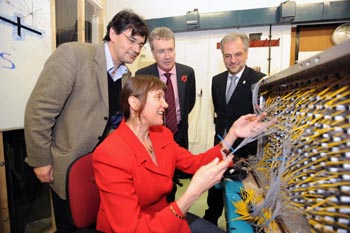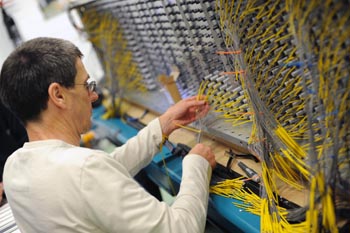Lancaster particle detector begins its journey to Japan for the T2K experiment

Lancaster University’s particle physics group have been putting the finishing touches to a £500k, 6 ton particle detector (an electromagnetic calorimeter module) which begins its journey this week to UK and European labs, before being shipped out to Japan in 2009.
The Lancaster group were awarded a five year grant of £3.8m to fund work on three high-profile collaborative experiments involving particle accelerators in the US, Japan and Europe. A section of one of the experiments – the electromagnetic calorimeter module, built in Lancaster - is a key component of research which hopes to unlock some of the deepest mysteries of the universe.
The module, which consists of layers of plastic scintillator bars interspersed with layers of lead alloy enclosed in a carbon-fibre skin, was built and partially calibrated at Lancaster by a large team of staff, technicians, PhD students and researchers managed by Dr Laura Kormos. The calorimeter will be positioned within a recycled magnet used in a previous Nobel Prize winning particle experiment. Its main purpose is to identify and measure the energy of electrons and gamma rays produced by neutrino interactions in target material upstream of the module.
Lancaster is one of only seven universities in the UK involved in the prestigious Tokai to Kamioka (T2K) project in Japan. The others are Imperial College, Queen Mary College and the universities of Liverpool, Oxford, Sheffield and Warwick. Additional support has been provided by the Rutherford Appleton and Daresbury Laboratories.

The T2K experiment, due to start in 2009, will direct an artificial neutrino beam underground for 295km towards a 50kton water Cherenkov detector which will measure neutrino oscillation – where neutrinos of one type turn into one of the other two types of neutrino.
The Head of Lancaster’s 5* Physics Department (and a member of the T2K collaboration) Professor Peter Ratoff explained: “If matter and antimatter were created equally at the time of the Big Bang, why is there so much more matter in the universe? Certain subtle properties of neutrinos could account for this. Furthermore, if we can measure the mass of the three types of neutrino, then their contribution to the overall mass of the universe could be determined, enabling us to answer questions about the ultimate fate of the universe.”
The particle physics group at Lancaster is also a founder member of the ATLAS experiment at CERN in Geneva, one of the largest collaborative efforts ever attempted in the physical sciences with more than 2000 physicists from 35 countries.
Lancaster is also involved in the DZERO experiment at the Fermi National Accelerator Laboratory in the USA, where our physicists have played a leading role in understanding some of the fundamental properties of particles containing ‘beauty’ quarks.